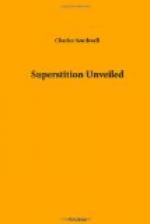There is an old story about a certain lady who said to her physician, ‘Doctor, what is your religion?’ My religion, madame, replied the Doctor, ‘is the religion of all sensible men.’ ’What kind of religion is that?’ said the lady. ‘The religion, madame,’ quoth the Doctor, ’that no sensible man will tell.’
This doctor may be given as a type of the class of shrewd people who despise superstition, but will say nothing about it, lest by so doing they give a shock to prejudice, and thus put in peril certain professional or other emoluments. Too sensible to be pious, and too cautious to be honest, they must be extremely well paid ere they will incur the risk attendant upon a confession of anti-superstitious faith.
Animated by a vile spirit of accommodation, their whole sum of practical wisdom can be told in four words—BE SILENT AND SAFE. They are amazed at the ‘folly’ of these who make sacrifices at the shrine of sincerity; and while sagacious enough to perceive that superstition is a clumsy political contrivance, are not wanting in the prudence which dictates at least a seeming conformity to prevailing prejudices.
None have done more to perpetrate error than these time-serving ’men of the world,’ for instead of boldly attacking it, they preserve a prudent silence which bigots do not fail to interpret as consent. Mosheim says, [47:1] ’The simplicity and ignorance of the generality in those times (fifth century) furnished the most favourable occasion for the exercise of fraud; and the impudence of impostors, in contriving false miracles, was artfully proportioned to the credulity of the vulgar, while the sagacious and the wise, who perceived these cheats, were overawed into silence by the dangers that threatened their lives and fortunes, if they should expose the artifice. Thus,’ continues this author, ’does it generally happen, when danger attends the discovery and the profession of truth, the prudent are silent, the multitude believe, and impostors triumph.’
Beausobre, too, in his learned account of Manicheism reads a severe lesson to those who, under the influence of such passions as fear and avarice, will do nothing to check the march of superstition, or relieve their less ‘sensible,’ but more honest, fellow-creatures from the weight of its fetters. After alluding to an epistle written by that ‘demi-philosopher,’ Synesius, when offered by the Patriarch the Bishopric of Ptolemais, [48:1] Beausobre says, ’We see in the history that I have related a kind of hypocrisy, which, perhaps, has been far too common in all times. It is that of ecclesiastics, who not only do not say what they think, but the reverse of what they think. Philosophers in their closet, when out of them they are content with fables, though they know well they are fables. They do more; they deliver to the executioner the excellent men who have said it. How many Atheists and profane persons have brought holy men to the stake under the pretext of heresy? Every day, hypocrites consecrate the host and cause it to be adored, although firmly convinced as I am that it is nothing more than a piece of bread.’




